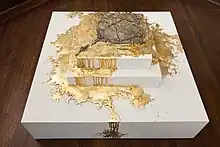Diana al-Hadid | |
|---|---|
| Born | 1981 (age 42–43) Aleppo, Syria |
| Education | |
| Known for | sculpture, installation |
| Spouse | Jon Lott |
| Children | 1 |
| Website | dianaalhadid |

Diana al-Hadid (born 1981) is a Syrian-born American contemporary artist who creates sculptures, installations, and drawings using various media. She lives and works in Brooklyn, New York.
Early life and education
Al-Hadid was born in Aleppo, Syria.[1][2] When she was five, her family immigrated to Cleveland, Ohio,[2] but she grew up mostly in North Canton, Ohio.[3] She grew up in an Islamic household.[4] Al-Hadid decided at the age of 11 that she wanted to be an artist.[5] She was inspired by family vacations to the middle east, visiting the Jeita Grotto in Lebanon and experiencing Islamic architecture.
In 2003, Al-Hadid received a BA in art history and a BFA in sculpture from Kent State University in Ohio.[3] In 2005, she received an MFA in sculpture from Virginia Commonwealth University, Richmond.[3] In 2007, she attended the Skowhegan School of Painting and Sculpture,[6] the same year she had her first solo exhibition.
Work
Al-Hadid makes sculptures from a large variety of materials such as steel, fiberglass, wood, aluminum, bronze, cardboard, expanded polystyrene, reinforced polymer gypsum, and wax.[7][4] She often works large-scale, working up to 4 meters tall, making large dreamlike or ghostly architectural forms out of dripping repetitive forms.
Much of Al-Hadid's sculpture is inspired by architecture, Surrealism, and painting. Al-Hadid notes architectural influences such as: the Sagrada Familia, a house built by Salvador Dali, the architectural theorist Christian Norberg-Schulz, as well as the intricacy and ornamentation found in Islamic and Gothic architecture.[8] Painting influences for Al-Hadid include northern Renaissance painting, Mannerist painting, Pieter Bruegel, Cy Twombly, and the presence of floating figures. Figures have shown up in her later work; she notes: "Islamic belief forbids figuration, and it's something I want to address."[4]
Many of Al-Hadid's sculptures have narrative or mythological references, such as Scheherzade, Ariadne, and Gradiva from Wilhelm Jensen's 1903 novella of the same name, who was also celebrated by the Surrealists.[2][4] Al-Hadid states: "I was raised [...] in a culture that very much prizes storytelling and the oral tradition. My work is partially inspired by myths and folklore from both Western and Arabic cultures."[4]
Al-Hadid cites Judy Pfaff and David Altmejd as sculptural inspirations.[8]
In 2018, Al-Hadid had her first public art installation, entitled Delirious Matter, in Madison Square Park. The installation featured four sculptures placed around the park made of polymer gypsum and fiberglass.[9][10][11] Delirious Matter was supported in part by an award from the National Endowment for the Arts.[9]
In 2019, Al-Hadid was commissioned by MTA Arts & Design to create a permanent installation of two murals in the mezzanine spaces at the 34th Street.[12] The two murals, entitled The Arches of Old Penn Station and The Arc of Gradiva, were recognized by the CODAawards.[13]
Other activities
- Institute for Contemporary Art at VCU, Member of the Advisory Board[14]
Collections and Awards
In 2009, she was a USA Rockefeller Fellow and a New York Foundation for the Arts Fellow.[15][16] In 2007 she won a Pollock-Krasner Foundation Grant, in 2011 she won a Joan Mitchell Foundation Grant. In 2020, she received The Academy of Arts and Letters Art Award.[17]
Collections holding her work include the DeCordova Museum and Sculpture Park,[18] Whitney Museum of American Art,[19] and the Virginia Museum of Fine Arts,[20] Al-Hadid has shown work at the Secession in Vienna, Austria;[21]
References
- ↑ "Diana al-Hadid". Art 21 | New York Close Up.
- 1 2 3 Jungerberg, Tom; Smith, Anna; Borsh, Colleen (November 2012). "Diana Al-Hadid: Identity and Heritage". Art Education. 65 (6): 25–32. doi:10.1080/00043125.2012.11519197. ISSN 0004-3125. S2CID 191876418.
- 1 2 3 Litt, Steven (27 November 2013). "The Akron Art Museum salutes Diana Al-Hadid, a Kent State grad in search of art world success - on her own terms". The Plain Dealer. Cleveland.com. Retrieved 16 February 2015.
- 1 2 3 4 5 Reisenfeld, Robin. “The Labyrinth in the Tower: A Conversation with Diana Al-Hadid.” Sculpture 28, no. 2 (April 2009): 24–31.
- ↑ Cashdan, Marina (September 2014). "Austria Bound". Surface (111): 60.
- ↑ Pollack, Barbara (14 November 2012). "Diana Al-Hadid Makes a Sculpture". ARTnews.
- ↑ "Artist: Diana Al-Hadid". Saatchi Gallery. Archived from the original on 19 September 2022. Retrieved 28 October 2015.
- 1 2 Amy, Michael. “Ghosts of Things: A Conversation with Diana Al-Hadid.” SCULPTURE -WASHINGTON-, January 1, 2013.
- 1 2 "Diana Al-Hadid: Delirious Matter". Madison Square Park Conservancy. Retrieved 2021-04-07.
- ↑ Hilburg, Jonathan (16 May 2018). "Diana Al-Hadid's delirious Madison Square Park installations are up for the summer". The Architect’s Newspaper. Retrieved 7 April 2021.
- ↑ Laster, Paul (22 May 2018). "Diana Al-Hadid melds sci-fi and spiritualism at Madison Square Park". Time Out. Retrieved 7 April 2021.
- ↑ Small, Zachary (2019-05-01). "The Arches of Old Penn Station Return in Diana Al-Hadid's Subway Mosaics". Hyperallergic. Retrieved 2021-04-07.
- ↑ "The Arches of Old Penn Station; The Arc of Gradiva". CODAworx. Retrieved 2021-04-07.
- ↑ Maximilíano Durón (March 2019), ICA VCU Adds Adam Pendleton, Adrienne Edwards to Advisory Board Institute for Contemporary Art at VCU.
- ↑ Siese, April (18 November 2015). "9 Syrian Americans Who Have Changed The World & Will Help You Rethink The Refugee Crisis". Bustle. Retrieved 7 April 2021.
- ↑ "CV - Diana Al-Hadid". www.dianaalhadid.com. Retrieved 2023-02-23.
- ↑ Letters, American Academy of Arts and (2020-03-03). "The American Academy of Arts and Letters Presents the 2020 Invitational Exhibition of Visual Arts". Hyperallergic. Retrieved 2021-04-07.
- ↑ "Blind Bust 1". The Trustees of Reservations. Retrieved 2020-10-27.
- ↑ "Diana Al-Hadid". Whitney Museum of American Art. Retrieved 2020-10-27.
- ↑ "Woven City (Primary Title)". Virginia Museum of Fine Arts. Retrieved 2020-10-27.
- ↑ La Forge, Thessaly (10 September 2014). "Artist Diana Al-Hadid on Fate, Form, and Freud—and Her New Exhibition at the Secession in Vienna". Vogue. CondeNast. Retrieved 17 February 2015.